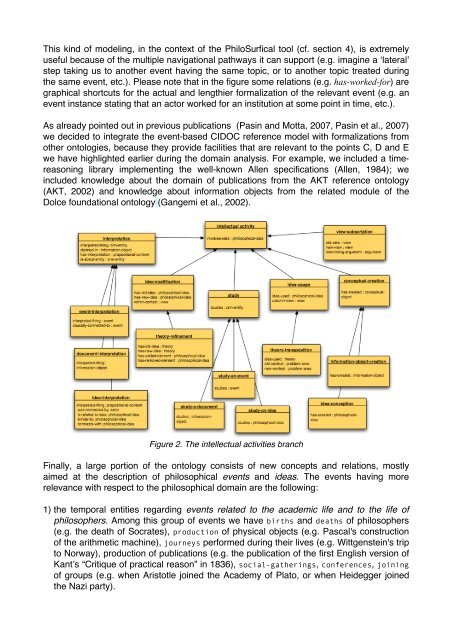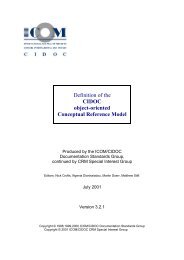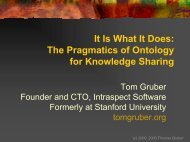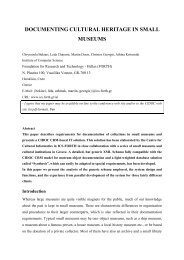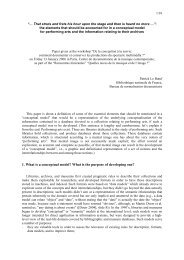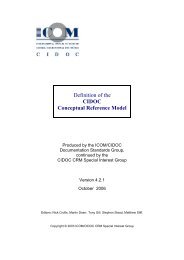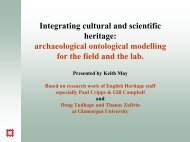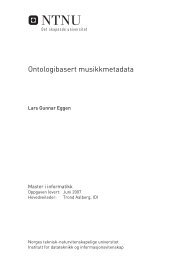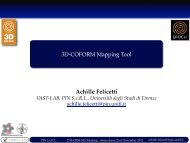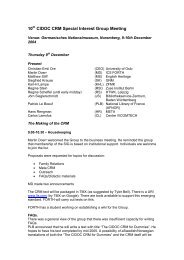This kind of modeling, in the context of the PhiloSurfical tool (cf. section 4), is extremelyuseful because of the multiple navigational pathways it can support (e.g. imagine a ʻlateralʼstep taking us to another event having the same topic, or to another topic treated duringthe same event, etc.). Please note that in the figure some relations (e.g. has-worked-<strong>for</strong>) aregraphical shortcuts <strong>for</strong> the actual <strong>and</strong> lengthier <strong>for</strong>malization of the relevant event (e.g. anevent instance stating that an actor worked <strong>for</strong> an institution at some point in time, etc.).As already pointed out in previous publications (Pasin <strong>and</strong> Motta, 2007, Pasin et al., 2007)we decided to integrate the event-based <strong>CIDOC</strong> reference model with <strong>for</strong>malizations fromother ontologies, because they provide facilities that are relevant to the points C, D <strong>and</strong> Ewe have highlighted earlier during the domain analysis. For example, we included a timereasoninglibrary implementing the well-known Allen specifications (Allen, 1984); weincluded knowledge about the domain of publications from the AKT reference ontology(AKT, 2002) <strong>and</strong> knowledge about in<strong>for</strong>mation objects from the related module of theDolce foundational ontology (Gangemi et al., 2002).Figure 2. <strong>The</strong> intellectual activities branchFinally, a large portion of the ontology consists of new concepts <strong>and</strong> relations, mostlyaimed at the description of philosophical events <strong>and</strong> ideas. <strong>The</strong> events having morerelevance with respect to the philosophical domain are the following:1) the temporal entities regarding events related to the academic life <strong>and</strong> to the life ofphilosophers. Among this group of events we have births <strong>and</strong> deaths of philosophers(e.g. the death of Socrates), production of physical objects (e.g. Pascal's constructionof the arithmetic machine), journeys per<strong>for</strong>med during their lives (e.g. Wittgenstein's tripto Norway), production of publications (e.g. the publication of the first English version ofKantʼs “Critique of practical reason” in 1836), social-gatherings, conferences, joiningof groups (e.g. when Aristotle joined the Academy of Plato, or when Heidegger joinedthe Nazi party).
2) <strong>The</strong> temporal entities related to the production <strong>and</strong> modification of philosophical ideas.<strong>The</strong>se types of events are gathered under the class intellectual-activity (see fig. 2).Among them, we can find conceptual-creation (event modeling the creation ofconceptual entities such as ideas <strong>and</strong> in<strong>for</strong>mation objects); idea-modification (eventsreflecting the changing of one or more ideas within the context of a view, e.g. theevolution of the meaning of “libido” in the work of Sigmund Freud); theorytransposition(class modeling the special case when a theory is taken out of a context<strong>and</strong> reused within another one, e.g. “Spencerʼs evolutionism”, which extends “Darwinʼsevolutionism” from biology to metaphysics), etc.3) <strong>The</strong> temporal entities representing philosophical historical periods, i.e., macro-events(in <strong>CIDOC</strong>, such entities are subsumed by a class named period) characterized by anintrinsic reference to a specific group of people or a school of thought. <strong>The</strong> importantclasses here are intellectual movement (e.g. the “enlightenment”) <strong>and</strong> philosophicalmovement (e.g. “logical positivism”, interpreted as an event). <strong>The</strong> <strong>for</strong>mal framework used<strong>for</strong> representing the characteristics of these entities has been previously discussed(Pasin <strong>and</strong> Motta, 2007) under the title ʻpattern #1: is rationalism a school of thought oran event?ʼ<strong>The</strong> other major section which we extended <strong>CIDOC</strong> with is the one departing from thephilosophical-idea class, which is located in the conceptual-object branch of theontology (according to <strong>CIDOC</strong>, this is where all abstract entities are). In relation to theinitial domain analysis, these <strong>for</strong>malizations satisfy the requirements described in points F<strong>and</strong> G. In section 3 we concentrate the discussion on this branch of the ontology.2.3 Support <strong>for</strong> alternative interpretationsIt is important to remember that only classes <strong>and</strong> relations are what remains unchangeablein our system, i.e., that is where lies the ontological commitment 4 we dem<strong>and</strong> fromanybody using the ontology. On the contrary, the instantiation of our classes with elementsspecific to a single philosophy is a process which relies entirely on a userʼs privateunderst<strong>and</strong>ing of that philosophy.As already discussed in section 1, this feature allows annotators to use our meta-languagewith a great degree of freedom. As a result, the interpretations of philosophical subjectsthey create can be very different from each other. <strong>The</strong> only downside, in such cases, isthat the results of incompatible instantiations are not h<strong>and</strong>led easily by computers, thusrequesting a manual integration.In order to provide a solution to this problem, the ontology features a mechanism by whichwe can construct alternative <strong>and</strong> possibly competing interpretations of the same entity, in such a way that the computer ʻknowsʼhow to h<strong>and</strong>le each interpretation as an alternative view on a common topic. Thismechanism becomes useful, <strong>for</strong> example, when we want to have multiple annotatorsworking simultaneously within a single ontology-based environment (i.e., because we areinterested in highlighting with precision how the various peopleʼs interpretations differ).


